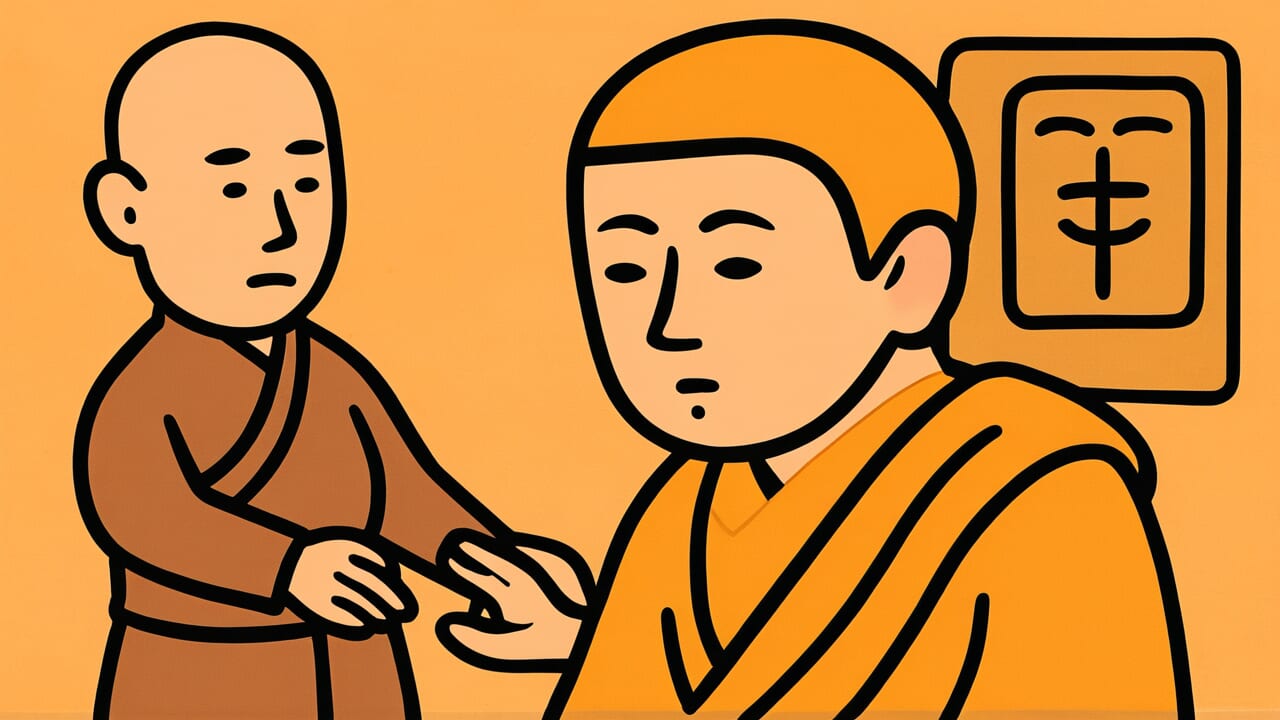How to Read “Lies and a monk’s head have never been tied up”
Uso to bōzu no atama wa yutta koto ga nai
Meaning of “Lies and a monk’s head have never been tied up”
This proverb means that both lies and a monk’s head remain in their natural state, without artificial modification.
A monk’s head has no hair to tie up, so it always stays in its bare, natural form. Similarly, lies exist in a simple, natural way without being decorated or elaborately constructed.
People use this proverb when talking about the essential nature of things. It serves as an example of things that don’t need to be dressed up or decorated, or things that simply can’t be modified in the first place.
Today, this phrase is understood as a humorous way to express the concept of being “as is” or “in a raw state.”
Origin and Etymology
No clear written records explain the origin of this proverb. However, the structure of the phrase reveals an interesting background.
During the Edo period, monks commonly shaved their heads. A monk’s bald head was the perfect example of a head that “has never been tied up.”
For people of that time, tying hair was part of daily grooming. A monk’s head that needed no tying stood out as a symbol of “a natural state without modification.”
Meanwhile, “lies” are also listed as something that “has never been tied up.” Here, “tying up” extends from the literal meaning of arranging hair to mean “artificially modifying” or “constructing.”
Lies are certainly created by people. But this proverb paradoxically views lies as having the quality of being “undecorated” or “as is.”
Just as a monk’s head physically cannot be tied, lies also essentially cannot be dressed up. They remain in their raw state.
This observation reflects the sharp eye of common people in the Edo period. It’s an expression filled with both humor and insight.
Usage Examples
- His story was simple and unadorned, just like “lies and a monk’s head have never been tied up”
- That claim is completely raw and unprocessed, as the saying goes, “lies and a monk’s head have never been tied up”
Universal Wisdom
This proverb has been passed down through generations because it reflects a universal human activity. We constantly try to distinguish between “natural” and “artificial” and identify the boundary between them.
Every day, we live while judging what is real and what is constructed. We tie our hair, apply makeup, choose our words, and adjust our attitudes.
Human society is, in a sense, a continuous process of “adding modifications.” That’s why things that cannot be modified, or don’t need to be, attract special attention.
What’s interesting is that this proverb pairs two seemingly unrelated things: “lies” and “a monk’s head.” A monk’s head that physically cannot be tied, and lies as a concept.
This combination shows human wisdom in understanding the essence of things. We connect concrete and abstract ideas to make sense of the world.
Thinking deeper, this proverb teaches us about the diversity of being “as is.” The “as is” state of a monk’s head gives a clean, orderly impression.
But the “as is” state of lies means undecorated frankness. Even the same “natural state” changes meaning depending on context. This flexible understanding is the depth of human wisdom.
When AI Hears This
When you tell a lie, you need more and more lies to maintain it. This is surprisingly similar to the law of entropy increase.
Entropy is a physical quantity that measures “the degree of disorder.” Everything in the universe naturally moves toward greater disorder when left alone.
A single lie creates a “low-entropy state” in information space. It’s an artificially created order. For example, if you lie saying “I was at the library yesterday,” contradictions arise with actual activity records and witness accounts.
This contradiction is information disorder, an increase in entropy. To suppress it, you must keep investing energy with additional lies like “I didn’t see anyone” or “My phone was off.”
A monk’s head follows the same principle. Hair grows 0.3 to 0.4 millimeters per day, sprouting randomly from follicles.
A freshly shaved head is a low-entropy state, an artificial order that defies natural law. Maintaining it requires constant energy investment through regular shaving.
Just as physicists explain that food spoils if you don’t keep running the refrigerator, both lies and monk’s heads cannot escape “the cost of maintaining order.”
Humans must eternally resist the force that pulls everything back to its natural state.
Lessons for Today
This proverb teaches us the importance of recognizing and accepting things in their “raw state.”
In modern society, “adding modifications” to everything has become normal. Photos are edited, profiles are polished, and words are carefully chosen.
In this environment, we need eyes that can distinguish what is original and what is constructed.
Among the information and relationships you encounter daily, what are the “things that haven’t been tied up”? What exists “as is”?
Developing a sense for finding these things helps you get closer to the essence of matters.
At the same time, think about yourself. Are you tired of constantly adjusting and decorating yourself?
Like a monk’s head, it’s important to have time when you can be your raw self, something that “doesn’t need tying up.”
Recognizing that some parts don’t need to be perfectly arranged lightens your heart.
This proverb teaches us, with humor, the value of being conscious of the boundary between modification and nature, between artifice and naturalness.



Comments